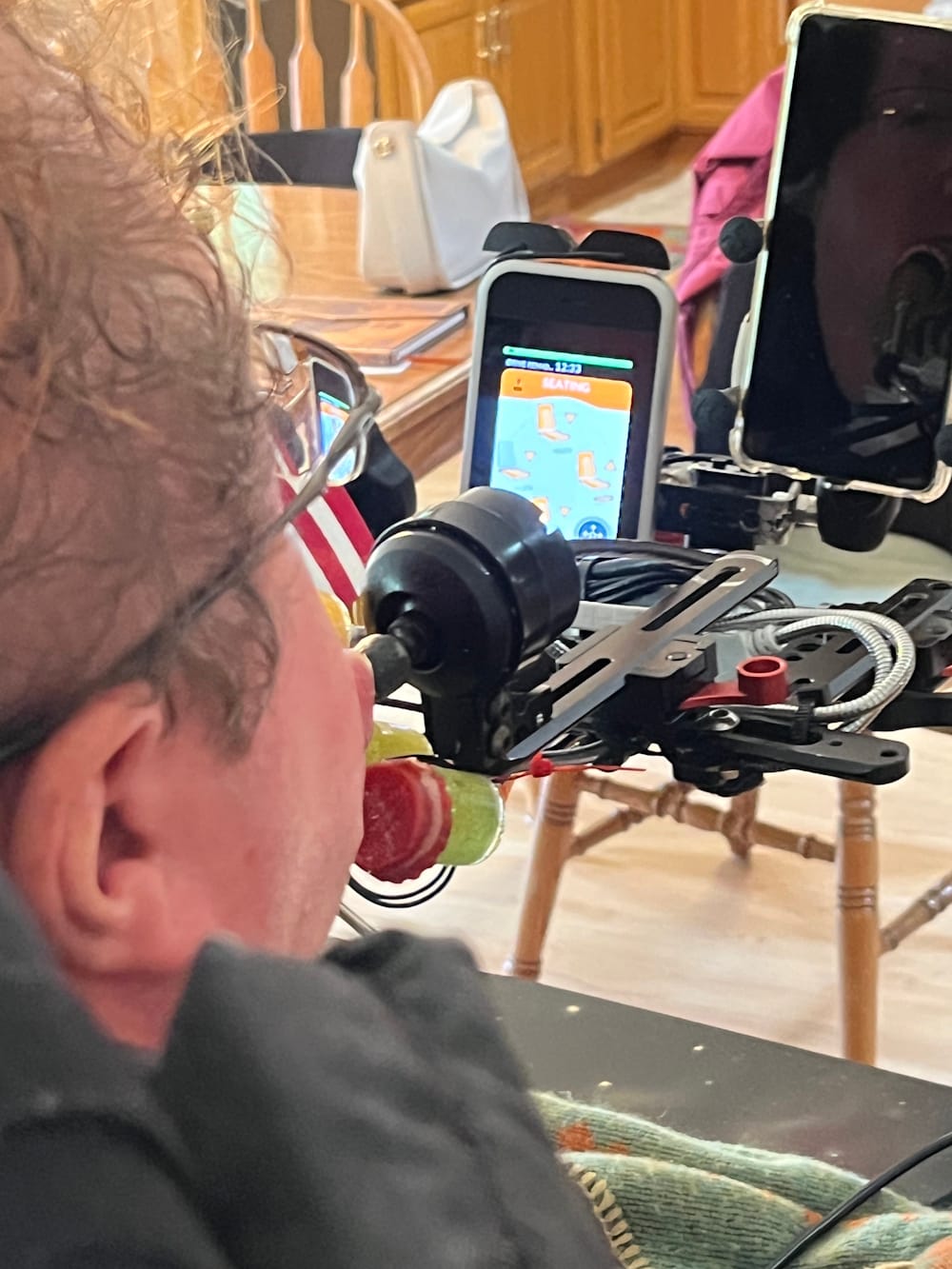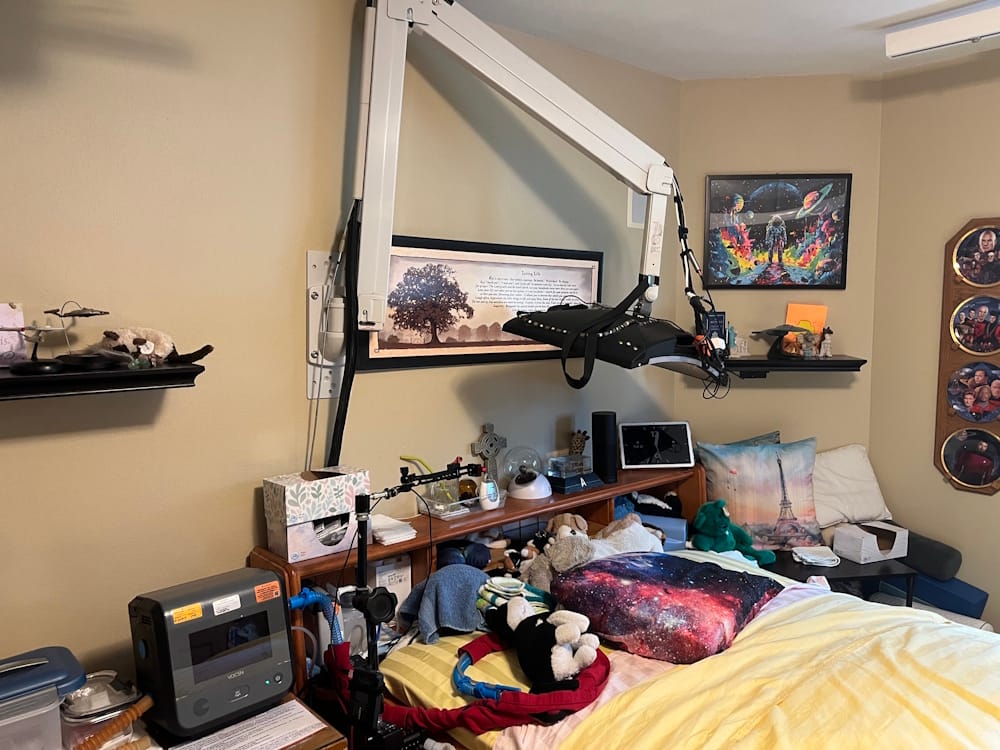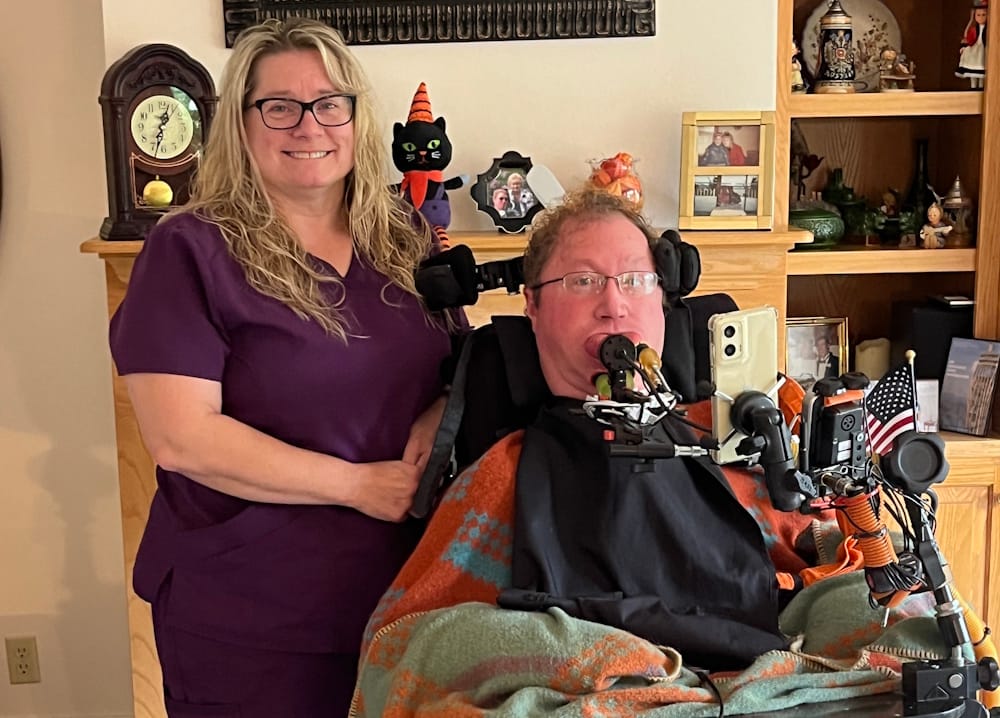Aided by Medicaid, man with muscle-wasting disease finds ways to make a difference
His main work is through the Fox Valley Advocacy Coalition, a collection of people and organizations dedicated to improving the lives of folks with disabilities.
By any measure of such things, Tim Carey’s life is meaningful, purposeful and rewarding.
He’s a builder and scripter at the online 3D virtual world Second Life; he’s the Vice President, Secretary and Webmaster at Fox Valley Advocacy Coalition; he’s a dedicated activist himself; and he’s a would-be sci-fi novelist.
Carey is all these things despite having lost the use of virtually all of his muscles and spending most of every day in a wheelchair, the result of being born with Duchenne Muscular Dystrophy, a muscle-wasting disease that afflicts one out of approximately 5,000 people worldwide.
The average life expectancy for a person with DMD used to be 28 but with improved cardiac care and ventilator support, many live until their thirties and forties.
Carey is 53, and his longevity is a testament to his will, certainly, but also to the purpose he has created for himself.
Because his tongue protrudes he has difficulty speaking but his cognition and intelligence seem well beyond that of the average person.
“I was just talking to someone about this earlier,” Carey says. “It’s hope and possibility. So it’s hope that I can make a difference. And it’s all the possibilities that everyone else has in their lives.”
Carey lives by himself in his elderly parents’ home in Grand Chute, aided by the care of Nicole Hull, a private nurse who provides a little more than 30 hours a week of caregiving. He has other nurses and a massage therapist – essential for relieving the pain of his atrophied muscles – who also attend to him.
Carey would like to work, but the strictures of Medicaid – a lifeline of support currently under threat, without which Hull says his quality of life would deteriorate beyond hope – prohibit him from making beyond a certain amount of money. So he devotes a large portion of his day to working on the Fox Valley Advocacy Coalition’s website while also actively advocating for people with disabilities.
Carey’s disease was discovered when he was three-and-a-half years old. His muscle deterioration reached a point that at age 18 he stopped breathing. The option for DMD sufferers when it reaches that point is stark: get fitted with a ventilator or wait for your muscles to deteriorate beyond the capacity that allows you to breathe. Ventilate or die, in other words. Not everyone chooses the former.
“My decision, medically, was like, yeah, I didn’t have a choice but to keep going forward,” Carey says.
Not just surviving … thriving
Without the use of any of his limbs, Carey relies on his deft tongue and a toggle switch to maneuver through his life, from tooling around his house in his chair to writing well-crafted Reflections on the Values and Direction of the United States. A sample:
It is troubling to witness Christians or others acting out of hate or behaving like bullies. The actions of elected officials and public figures who engage in revenge, name calling, ridicule and blame are particularly disappointing. While free speech is a protected right, mocking others is neither Christian nor respectful, and it reflects on the caliber of the individual.
Directly in front of his tongue is the toggle – his control center. He smoothly scrolls through his phone, taps on icons, checks his upcoming appointment, brings up the keyboard, pecks out messages – all via agile flicks of his tongue that maneuver the toggle.
His bed is even more high-tech with a monitor that hovers above him like the light above a dentist’s chair. He does much of his work on that monitor using a similar toggle operation as the one on his chair.


Left, Carey's wheelchair is armed with several gadgets that allows him to conduct his daily life, including a tongue toggle that he can use to scroll on his phone or to maneuver his wheelchair; the monitor above Carey's bed that allows him to work on websites and other projects.
Carey has earned multiple college degrees. He has an associated degree in programming from Fox Valley Technical College and BAs in both math and computer science from Lawrence University.
He says he chose computers because he loves technology and because he knew it would be one of the key ways he could function in the world. He has been fascinated by computers since he was eight years old, he says.
“Technology helps me communicate out to the world,” he says. “I really tried to get a job but they told me, either, they didn’t hire part-timers or they said they weren’t sure with my disability I could do what I told them I could do. And then I’m not allowed to make much money (to remain eligible for Medicaid).”
At that point, he says, he decided he was going to dedicate his life to helping people however he could, whether it was advocacy or helping people with disabilities in the virtual world. That is where his work at Second Life comes in. It is an online virtual community that provides users with their own avatar and allows them to join various groups of interest, to communicate, to share experiences, even go to a virtual dance party. (Carey recently organized his own such party). It is an ideal way for homebound people to create their own social circles and to meet with other like-minded people or people who share similar life circumstances.
“I've been talking to a lady (on Second Life) about some of her problems with having a disability,” he says. “I've been just using my experience to tell her I do this or I do that.”
Fox Valley Advocacy Coalition
Carey’s main work is through the Fox Valley Advocacy Coalition, a collection of people and organizations dedicated to improving the lives of folks with disabilities. According to their website, the main focus of FVAC is parking, transportation, education and legislative advocacy.
Carey is responsible for the upkeep of the site and has recently organized speaker presentations.
He was in the middle of the fight against Republican efforts to outlaw voters from allowing another person to drop their ballots in the mail or a drop box, something that has created a clear barrier for someone like Carey, who cannot reach his mailbox. He recently provided guidance via the FVAC website for people to submit comments to the Election Assistance Commission opposing a petition by America First Legal Foundation that seeks to mandate proof of citizenship for voters.
Carey says he loves doing this work, noting that he loses his sense of time when he’s fully engaged in it. He has to be careful, though, because Medicaid, in addition to limiting an enrollee’s income and personal assets, also places limits on volunteer work.
He rolls his eyes when he admits he voted for President Trump in 2016. Never again, he insists, admitting he’s embarrassed now. Among his Reflections, he bemoans not just what he sees as a lack of character coming from the current administration but the moral implications of government downsizing:
Such widespread layoffs are damaging, and there must be alternative ways to restructure federal and state agencies without causing so much harm. Despite these layoffs, the President continues to allocate millions of dollars for personal projects such as a military birthday parade and frequent golf at his own hotels, including the costs of housing his security detail. These spending choices raise questions about priorities and the impact on the nation.
Potentially life-altering cuts to Medicaid
In July, the Republicans, without a single Democratic vote, passed the budget reconciliation bill that drastically shifts the nation’s priorities, especially regarding the social safety net. Included in the bill was a $4 trillion tax cut. The Center on Budget and Policy Priorities estimates families making under $50,000 a year will realize a $300 savings, while those making more than a million can expect a $90,000 annual tax cut. To help pay for some of that tax cut, Congress cut $800 billion from Medicaid. Seventy million Americans are enrolled in the program, while, in Wisconsin nearly one in four people rely on it.
It will ultimately be up to the state of Wisconsin to determine who remains eligible and who is taken off the rolls once the cuts take effect in 2027. For Carey, as well as Nicole Hull, the wait to find out will be a stressful one. Hull’s livelihood depends on it. Carey’s independence does as well.
“I'm a private duty nurse,” Hull says. ““The medically complex patients from children to adults qualify for skilled nursing hours. You know, Medicaid has money for that to help keep them at home, keep them in their schools, and keep people out of facilities.”
With stricter eligibility requirements and requests for ever more complex proof of need, people are certain to fall off the rolls. Hull, who helps Carey fill out his annual re-enrollment forms, says the notion that people like Carey are committing fraud is absurd.
“Yeah, they keep talking about fraud,” Hull says. “It's like they're targeting the wrong people. They should be targeting the middlemen, the durable equipment companies, the agencies. That's where it's going on. Not the participants, because there are just so many checks and balances and so much paperwork.”
With the independence such government support affords him, Carey has developed interests even beyond his advocacy work. He loves plants and tends to a Shamrock in his bedroom. He finds quantum physics fascinating. He’s not a big sports fan but follows the Packers. He’s also at work on a science fiction novel, having settled on, then discarded several titles already.
Like a death sentence
Carey said it infuriates him that Medicaid limits what he can do with his life. He says he’d consider running for the state assembly, arguing that people with disabilities need representation. But he would almost certainly no longer qualify for Medicaid with the salary he'd receive.
“For us to have legislators that understand people with disabilities,” he says. “I mean, I understand that legislators can’t know everything about everything. I think everybody should be able to participate in the process. I mean, look at FDR?”
States are not required to offer home-based health care under Medicaid and there is a risk that that could be one of the first things to go when the cuts come through. Hull says she might not be the only independent business person to be out of a job if that happens.
“(Medicaid) also employs a lot of other services,” Hulls says. “The massage therapy that comes totally impacts his quality of life beyond measure. And I mean, that's another independent small business woman. And we're already facing a shortage of care.”
Mostly, though, she worries about what it would do to Carey if he was forced into an institution, where there would be no way he could receive the constant care he requires, not to mention the loss of independence that would likely take away all the things that allow him to thrive at home.
“My fear for the people they’d put into a nursing facility, and just based on numbers and time they can give, is there's going to be a pressure sore and end of life within a year,” she says. “So, it's like a death sentence. I mean, a facility would be like a death sentence. And for him mentally, that would just be crushing, because he is so independent. And that would just be taken away.”







